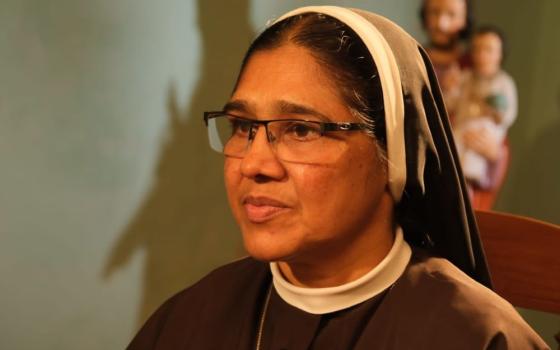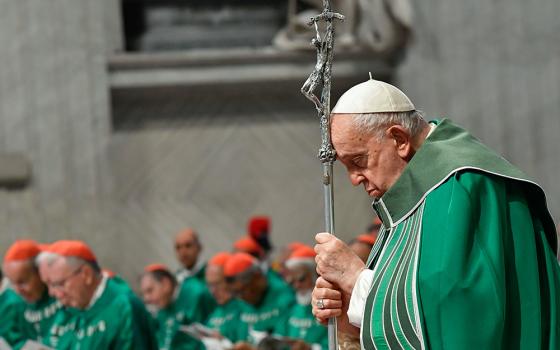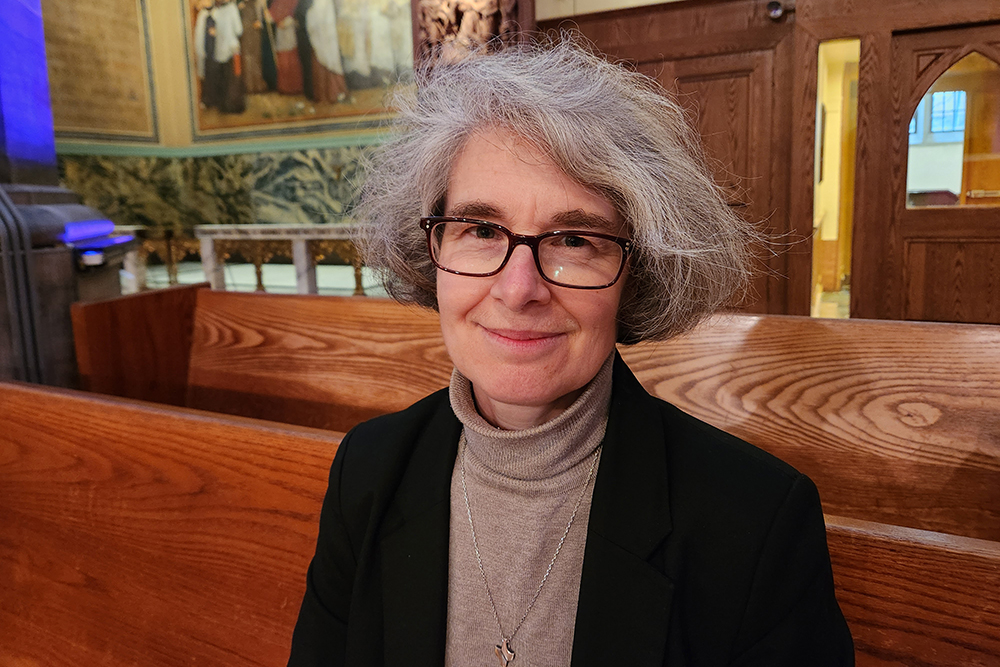
Sr. Nathalie Becquart, undersecretary of the Vatican's General Secretariat of the Synod, told GSR in a March 28 interview at a Manhattan church that she will vote during the October Synod of Bishops on synodality. (GSR photo/Chris Herlinger)
Sr. Nathalie Becquart, undersecretary of the Vatican's General Secretariat of the Synod, says she will vote during the October Synod of Bishops on synodality, echoing recent comments by Pope Francis that everyone attending the synod as a member will be able to vote — both men and women.
"Yes, yes, I will be voting," Becquart said in an interview with Global Sisters Report on March 28 prior to delivering a lecture in Manhattan sponsored by Fordham University's Center on Religion and Culture.
Becquart, a French Xavière sister, said it is too soon to say who the other members of the synod will be, but it is possible that other sisters might be voting members.
"From the beginning, we've had women involved in the synodal process," she said, adding that it has "been important to have women involved at all levels" in preparing for the synod.
"You can't listen to all of the people of God if you don't listen to women and sisters."
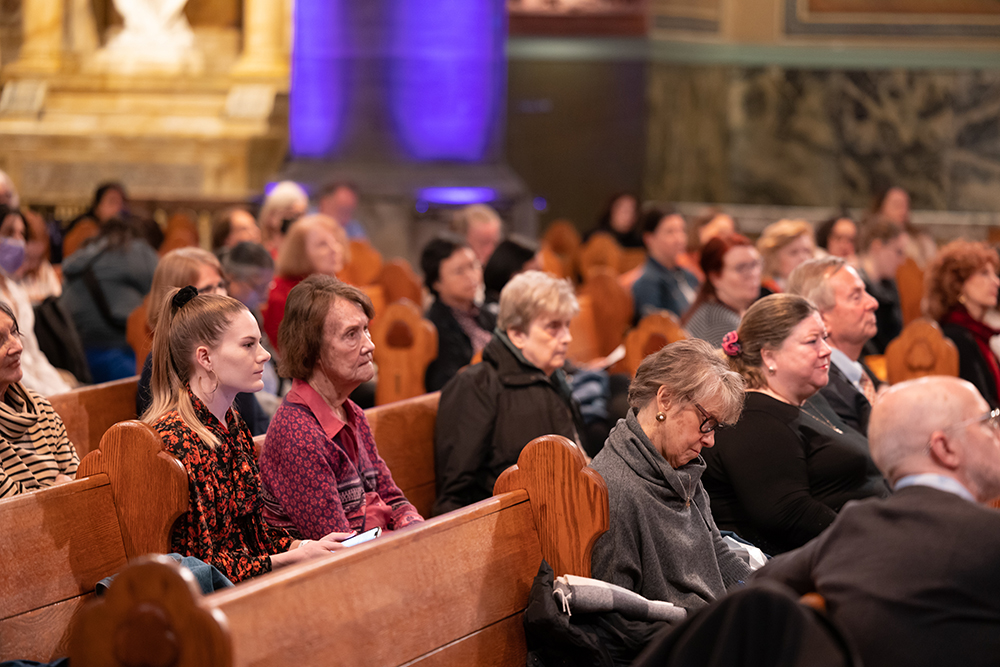
Audience members listen to Sr. Nathalie Becquart at a March 28 lecture at the Church of St. Paul the Apostle in Manhattan. During a question-and-answer period, audience members asked Becquart about the challenges of changing a highly hierarchical, male-dominated institution like the Catholic Church. "We need to face the tension. That is what we're learning," she replied. (Fordham University/Leo Sorel)
Francis' February 2021 landmark appointment of Becquart as one of the undersecretaries of the General Secretariat of the Synod meant she would be automatically entitled to vote in the assembly, planned for this year and 2024.
Bishops and members of male religious orders have traditionally been the only ones to vote in synods, though women have participated. However, in a recent interview, Francis told the Argentine newspaper La Nación, "Everyone who participates in the synod will vote. Those who are guests or observers will not vote."
Anyone who is a member "has the right to vote. Whether male or female," he added. "Everyone, everyone. That word everyone for me is key."
Becquart downplayed attention to her role, noting she serves the synodal process and it is "not to say what is this or that" — meaning she is not in a position to address the specifics of the synod makeup.
'You can't listen to all of the people of God if you don't listen to women and sisters.'
—Xavière Sr. Nathalie Becquart
She said the entire synodal process has been to "to listen to each other and discern the Holy Spirit," adding that sisters have been in the forefront of embracing a new synodal-like leadership model that places importance on listening, communal discernment and promoting "servant leadership."
Becquart said it would be difficult not to address the overall issue of "rethinking women's participation" at the synod, including the issue of women deacons and the ordination of women as priests.
The theme is highlighted in the "Working Document for the Continental Stage," a 45-page pre-synod synthesis document listing a number of the major themes from listening sessions held with millions of Catholics across the globe during 2022.
Earlier this year, continental synodal meetings took place to review the synthesis document in light of each continent's needs and priorities. A final report from each continent must be submitted to the Vatican by the end of March. That final document will form the basis for the synod's working document, known as the instrumentum laboris, which will guide the next stage in Rome and will be completed in June.
Advertisement
Becquart said the synodal consultation shows there is not one single way to respond to the call for rethinking women's participation in the church. She said women's ordination is a more pressing concern in the West and global North than in Africa, Asia and the Middle East, where Catholics say day-to-day discrimination against women is more pressing.
During the interview, Becquart quoted from the continental stage document, noting that "a critical and urgent area ... concerns the role of women and their vocation, rooted in our common baptismal dignity, to participate fully in the life of the Church. A growing awareness and sensitivity towards this issue is registered all over the world."
The report also said: "From all continents comes an appeal for Catholic women to be valued first and foremost as baptized and equal members of the People of God. There is almost unanimous affirmation that women love the church deeply, but many feel sadness because their lives are often not well understood, and their contributions and charisms not always valued."
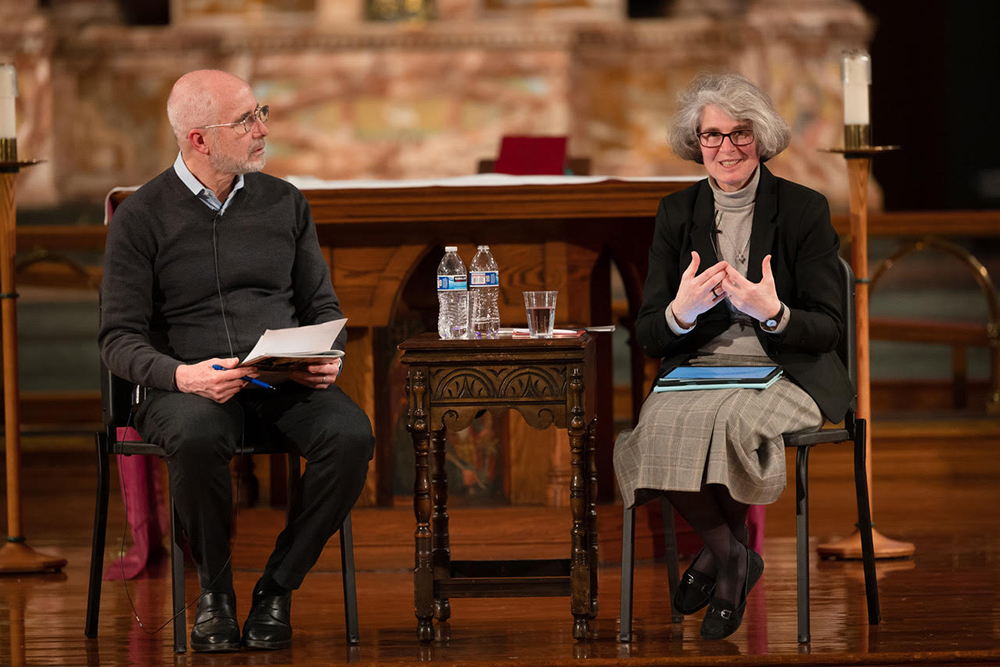
David Gibson, left, director of the Fordham University Center on Religion and Culture, noted that while The New York Times described Sr. Nathalie Becquart, right, as "the nun reshaping the role of women inside the Vatican," he believes an equally deserved accolade is her role as "global representative of synodality." The Fordham center sponsored Becquart's March 28 lecture. (Fordham University/Leo Sorel)
Becquart has been perhaps the most public symbol of the synodal process — something that David Gibson, director of the Center on Religion and Culture, noted in his introduction to Becquart's Fordham lecture, "Women and Youth: The Driving Force of Synodality."
Gibson said while The New York Times described Becquart as "the nun reshaping the role of women inside the Vatican" because of her landmark appointment, he believes an equally deserved accolade is her role as "global representative of synodality." (Becquart told GSR she attended four preparatory synod assemblies around the globe in the last year.)
In her lecture, Becquart noted that a synodal church is a "listening church" and that the synodal process is meant to continue the work of the Second Vatican Council, which was about "the people of God journeying in history and discerning the signs of the times."
Yet discernment is nothing new in church history, she said.
"Exercising discernment is at the heart of synodal processes and events," she said. "That is the way it has always been in the synodal life of the church."
'Young people are a gift. They can wake up the world. They can rejuvenate the church.'
—Xavière Sr. Nathalie Becquart
The task now, she said, is becoming a synodal church, which means "listening to and involving young people and women."
Becquart said young people and women are "change-makers in society," but both groups face challenges in the church: Women continue to suffer a lack of recognition and affirmation in the church, and young people feel they need better formation and communication with the church.
"We can look for more inclusive and creative ways to discover and nurture their spirituality," she said.
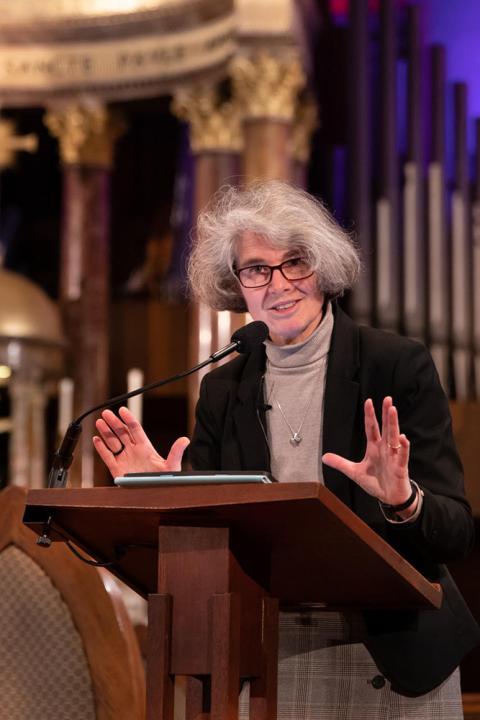
Sr. Nathalie Becquart delivers a lecture March 28 at the Church of St. Paul the Apostle in Manhattan, New York. (Fordham University/Leo Sorel)
The 2018 Synod of Bishops on youth taught the church that young people want to be heard, which Becquart said prompted the need for listening. Young people also want to be protagonists, which means they seek greater participation in the church, but they also need guidance, which means they need accompaniment.
"Young people are a gift," she said. "They can wake up the world. They can rejuvenate the church."
Young people also seek a synodal model based on Jesus' own ministry with his disciples.
"Jesus goes to meet them; Jesus begins by asking a question; Jesus starts a dialogue; Jesus reaches something deep within them; Jesus walks with them, even in the wrong direction; Jesus leads them to encounter him," she said in her lecture. "This encounter sets them on fire for mission amidst the Christian community."
Becquart noted both women and young people feel that the church and wider society do not sufficiently recognize their gifts and abilities.
"A Church that seeks to live a synodal style cannot fail to reflect on the condition and role of women within it, and consequently in society more generally. Young men and women ask this question forcefully," she said, quoting from the final document from the 2018 synod.
During a short question-and-answer period, Becquart fielded several questions centered on the difficulty of changing a highly hierarchical, male-dominated institution like the Catholic Church.
'It's a long process of ups and downs. It's a change of mindset. It takes time.'
—Xavière Sr. Nathalie Becquart
"We need to face the tension. That is what we're learning," she replied, adding that she felt the synodal process will yield fruitful results.
"It's a long process of ups and downs," she said. "It's a change of mindset. It takes time."
In keeping with a synodal church's "dialogue with the world," the synod will open with an ecumenical vigil of prayer at St. Peter's Square on Sept. 30 that will include participation by Protestant and Orthodox churches, she said.
"It will be a gathering of the people of God," she said, and "all are invited."
Becquart delivered her lecture at the Church of St. Paul the Apostle, which adjoins Fordham University Lincoln Center. Becquart spoke as the lecturer for the Russo Lecture series.
[NCR Vatican correspondent Christopher White contributed to this report.]



